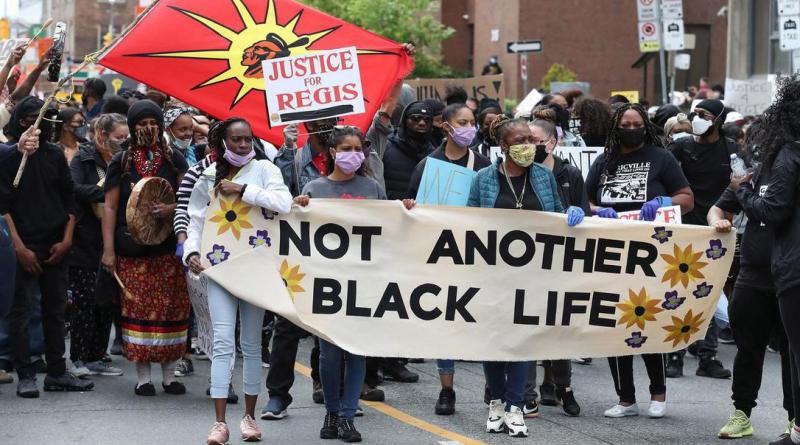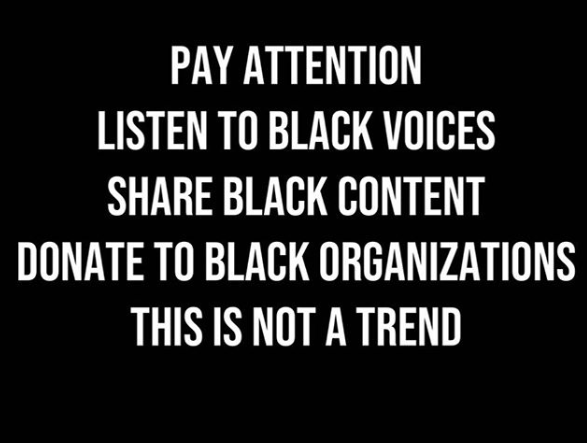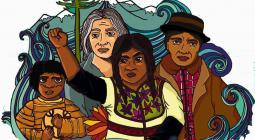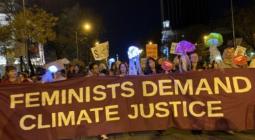Climate justice means justice for black lives.

The work of dismantling white supremacy is critical to building a climate movement that is rooted in justice.
As we watch people across North America rise up to confront racist police violence and white supremacy, we must grapple with Canada’s long history of state-sanctioned violence against Black and Indigenous people.
We, at 350 Canada, share the grief and outrage over the murders of Regis Korchinski-Paquet, George Floyd, and Breonna Taylor. Their lives were tragically cut short because of entrenched white supremacy in our society that over-polices, criminalizes, and systematically murders Black and Indigenous people.
We also acknowledge that the work of dismantling white supremacy is critical to building a climate movement that is rooted in justice. You can read more about the systemic impacts of white supremacy on Black communities in Canada in this interview with Desmond Cole.
Around the world, Black, Indigenous, and racialized communities are the ones hardest hit by the climate crisis. We see this from the Inuit communities on the frontlines of climate change in the Arctic, to the millions losing their lives to drought in East Africa. We also know that the fossil fuel companies responsible for the vast majority of emissions driving the climate crisis are the same ones pillaging the ancestral lands of Indigenous peoples without their free prior and informed consent. These industries also disproportionately displace and compromise the health of Black and poor communities.
At 350 Canada, our mission has always been to build a people-powered climate movement rooted in justice. We strive to build a movement that is rooted in justice. We know that our planet isn’t in crisis only because of rising emissions, but because of systems of extraction and exploitation that put profit ahead of people. We have learned through years of organizing people to fight for the climate that we cannot address the climate crisis without addressing rising social and economic inequality, or the deep roots of racism and colonialism.
That’s why, when the COVID-19 pandemic hit earlier this year, we heard from many in our communities that, right now, we have to take care of one another, and ensure elected officials have peoples’ backs first. So, we shifted our work to support mutual aid efforts and demand a Just Recovery that puts people, our planet and justice at the forefront of pandemic recovery.
Last week, an alliance of hundreds of grassroots groups, organizations, and unions across the country released the 6 Principles of a Just Recovery:
- Put people’s health and wellbeing first. No exceptions.
- Strengthen the social safety net and provide relief directly to people.
- Prioritize the needs of workers and communities.
- Build resilience to prevent future crises.
- Build solidarity and equity across communities, generations, and borders.
- Uphold Indigenous Rights and work in partnership with Indigenous peoples.

A Just Recovery isn’t just about how we move forwards. It’s also a clear declaration that we won’t return to a fatally dysfunctional business as usual. We all know this business-as-usual is harming our planet but as these past few days have made clear, it’s also brought an urgent, deadly harm to Black communities in particular. As we demand a Just Recovery to build back better after the pandemic, we must reorient our society to tackle the climate crisis, rising inequality, and systemic racism. A Just Recovery is not possible if Black people continue to be targeted and murdered by police and state violence.
We all need to step up to fight racism in all its forms and work to dismantle white supremacy. We are committed to a Just Recovery that will transform our systems to address the climate crisis, rising inequality, and systemic racism. That means defunding harm to our communities, whether it comes from the fossil fuel industries or the police. By making this decision, we know that our municipal, provincial, and federal governments will have billions of dollars in public money to redirect to a Just Recovery. Defunding these harmful institutions means we can put much-needed money and resources towards education, healthcare, housing for all, and other essential community services.
Today, and every day, we must fight the systemic harm and violence towards Black and Indigenous communities, who are disproportionately impacted by COVID-19, the climate crisis, and the violence of white supremacy. And in this particular moment, it is especially important to center anti-black racism, oppose white supremacy, and stand in solidarity with the demands of the Black Lives Matter movement. Building a movement rooted in the needs of those most oppressed and vulnerable is the only way we can achieve liberation for people and the planet.

Here are some immediate steps we have taken and places to donate in Canada:
- Donate to Justice for Regis Korchinski Paquet Fund
- Support Black Lives Matter Toronto and other organizations that serve Black people in your community
- Listen to Pam Palmater’s Podcast with Desmond Cole on Anti-Black Racism in Canada & US
- Read Sandy Hudson’s op-ed on how “Defunding The Police Will Save Black And Indigenous Lives In Canada”
As a team of predominantly white and non-black people of colour organizers, we are asking ourselves the difficult and important questions of what it means to do anti-black racism work in the climate movement.
Here are some additional resources we recommend to begin to understand how the climate justice movement must center anti-black racism, dismantle white supremacy, and defund the police:
- “The Climate Movement’s Silence” by Emily Atkin
- “What we must do to dismantle white supremacy” by Natalia Cardona and Rell Brown of 350.org
- “The Climate Justice Movement Must Oppose White Supremacy Everywhere — By Supporting M4BL” by Mattias Lehman, Sunrise Movement Digital Director
- 8-page foldable zine on why we must defund the police by MPD 150
- “Anti-racism resource for white people” open Google doc by Sarah Sophie Flicker and Alyssa Klein
- Our friends at the Leap compiled a list of ways to support the frontlines in Canada & US here
*Listen HERE
3 June 2020
Medium




